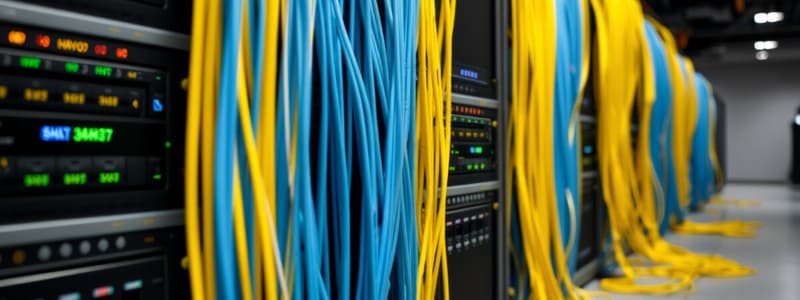Podcast
Questions and Answers
What is the primary function of a router in a network?
What is the primary function of a router in a network?
- To store data for users accessing the network
- To connect clients directly to the Internet
- To provide a unique IP address to each host
- To transmit data between networks on the Internet (correct)
Which statement best describes the relationship between clients and hosts?
Which statement best describes the relationship between clients and hosts?
- A host is always a server in a Client/Server model
- A client accesses services provided by a server, not a host (correct)
- Clients and hosts are interchangeable terms
- A client can exist independently of a host
How are hosts identified on the Internet?
How are hosts identified on the Internet?
- By the router they are connected to
- Through their MAC addresses
- Using a combination of IP addresses and domain names (correct)
- By their unique domain names only
What does the Client/Server Model primarily achieve?
What does the Client/Server Model primarily achieve?
Why is routing on the Internet typically dynamic?
Why is routing on the Internet typically dynamic?
In the context of networking, which of the following is an example of a host?
In the context of networking, which of the following is an example of a host?
What analogy is used to compare IP addresses?
What analogy is used to compare IP addresses?
What distinguishes a client from a server?
What distinguishes a client from a server?
Which of the following correctly defines a host?
Which of the following correctly defines a host?
What can you infer about a static IP address?
What can you infer about a static IP address?
Flashcards are hidden until you start studying
Study Notes
Internet and Hosts
- A host is any computer or device connected to the Internet, such as computers, printers, and smartphones.
- The Internet is defined as a network of interconnected networks.
- Each host on the Internet has a unique IP address, analogous to a physical mailing address.
Basic Architecture
- Hosts connect to the Internet via a router, which is a specialized computer that routes data between networks.
- Routers act as central hubs within a Local Area Network (LAN) and facilitate dynamic routing, meaning routes are not predetermined.
IP Addressing
- Hosts are reachable through their unique IP addresses or domain names (e.g., njctl.org corresponds to IP address 35.162.99.125).
- IP addressing functions similarly to the postal service, directing data (or "mail") to the correct destination based on the address.
Client/Server Model
- The Client/Server Model organizes interactions in the Internet, separating service providers (servers) from service requesters (clients).
- For example, Gmail utilizes Google's servers to manage email, with clients sending requests to access or send messages.
Client vs. Host
- A client can be either hardware or software that requests services from a server, distinguishing it from a host.
- A host refers to the physical device or computer, which can operate as either a server or a client.
- Servers are located on hosts and provide necessary services to clients, whereas clients do not share their resources.
Studying That Suits You
Use AI to generate personalized quizzes and flashcards to suit your learning preferences.




